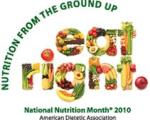Our blog theme healthy food on a budget fits this year’s theme because the month of March is the perfect opportunity to begin to plan for ways that one could start to think of getting good nutrition and reducing food cost through gardening or access to local foods this coming season.
One area to consider getting healthy foods is to grow your own food. What a fun way to know where your food actually comes from by starting a garden in your backyard or at a community garden plot. I have to admit this takes a bit effort and more information gathering than just digging up an area and planting seeds. You must make sure your soil is safe and free of lead or other contaminants that are often found in urban gardening. Here are several links to check out for gardening and making sure that you are off to a safe and healthy start.
The Boston Natural Areas Network (BNAN) can provide lots of information regarding gardening in Boston: http://www.bostonnatural.org/ Also BNAN is having a Garden’s Gathering on Saturday, March 20, 2010 11AM – 5 PM at Northeastern University. This is FREE event will have lots of local garden resources and information.
The Food Project is another great resource regarding soil testing, creating raised bed gardens and other tips: http://thefoodproject.org/local-food
Another place to start if you want to support local food and produce is to consider joining Community Support Agricultural (CSA). Over the last 20 years, Community Supported Agriculture (CSA) has become a popular way for consumers to buy local, seasonal food directly from a farmer. Here are the basics of how a CSA operates:
A farmer offers a certain number of “shares” to the public. Typically the share consists of a box of vegetables, but other farm products may be included. Interested consumers purchase a share (aka a “membership” or a “subscription”) and in return receive a box (bag, basket) of seasonal produce each week throughout the farming season. This arrangement creates several rewards for both the farmer and the consumer.
Advantages for farmers:
- Get to spend time marketing the foods they grow early in the year, before their long days in the field begin
- Receive payment early in the season, which helps with the farm’s cash flow and capacity to do business
- Have an opportunity to get to know the people who eat the food they grow
Advantages for consumers:
- Eat ultra-fresh either organic or grown with minimum pesticides food, with all the flavor and vitamin benefits of foods grown locally
- Get exposed to new vegetables and new ways of cooking
- Find that kids typically enjoy foods from “their” farm – even veggies they’ve never been known to eat
- Develop a relationship with the farmer who grows their food and learn more about how food is grown
While the cost of joining a CSA at first is challenging, most CSA have payment plans to allow families / individuals to adjust to the cost. For example, one CSA would cost a family $400 however the actual cost is just $26 per week for 15 weeks of fresh organic local grown fruits and vegetables, this is a lot less than what a consumer would pay for the same amount of organic produce in the grocery store.
Joining a CSA is a simple enough idea, but its impact has been profound because not only are you getting local fresh produce but you support local farmers and working toward building a sustainable agriculture industry , which is what we all want for the future. If you are interested CSA’s serving the Boston areas click here: Massachusetts_CSA_DirectoryBoston
If these options are not what you are ready for at this point, you can still support nutritious foods from the ground up by going to the local Farmers’ Markets when they begin in June. This is a great way to purchase local produce without growing it yourself or joining a CSA. Many of the markets take Electronic Debt Transfers (EBT) to support using Food Stamps. Boston also has the advantage of Bounty Bucks to increase the value of using your food stamps at Framers’ Markets. To learn more about Farmers’ Markets and Bounty Bucks click: http://thefoodproject.org/boston-bounty-bucks.
So take the time this month, to check out ways that you can plan for the coming growing season and take advantage in any way that fits for you to have healthy foods that support nutrition from the Ground Up.

March 6, 2010 at 4:20 am
I had no idea that March is Nutrition month. Thanks for sharing and nice job describing CSA.
March 8, 2010 at 9:23 pm
I hope you find ways to access local produce this growing season anyway that meets your budget. Stay tuned as we approach the arival of the Farmers’ Markets, we will be posting lots of great recipes and cooking tips.
Kathy
June 28, 2010 at 11:28 pm
This is a wonderful post. I also did not know March was nutrition month. After reading this I am going to have to get started on my fresh vegetable garden!!
June 29, 2010 at 12:00 pm
Good luck with the garden, starting small at first has worked well for me . Let me know what you have planted .
Kathy